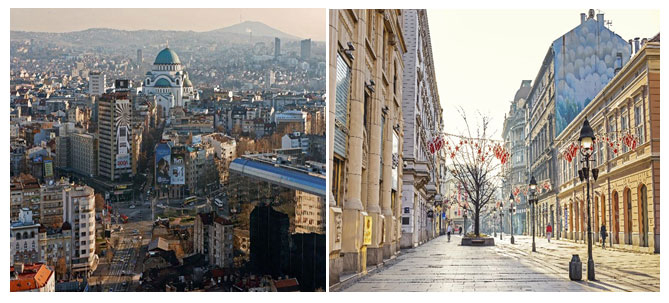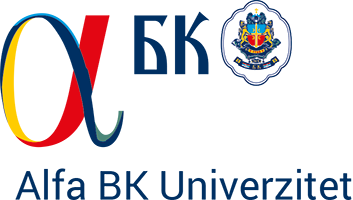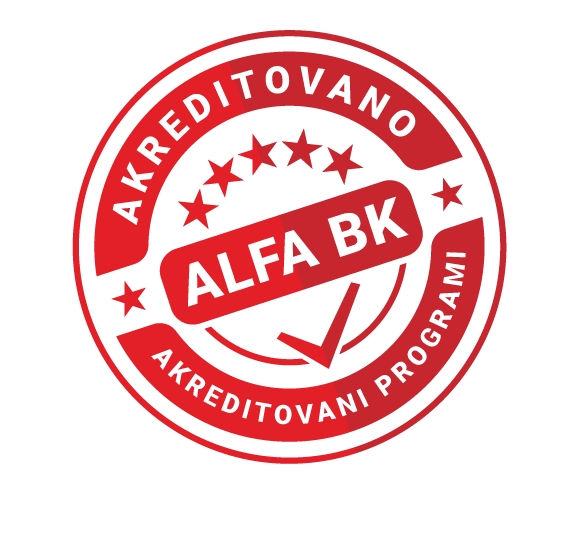Incoming students guide
General information
One of the key aspects of the international cooperation of the Alfa BK University is the extensive exchange of students, professors, assistants, associates, researchers and administrative staff within the Erasmus + Programme`s framework. In that sense, academic mobility appears as one of the strategic goals of the Alfa BK University`s functioning.
One of the basic objectives of the University is to establish an appropriate balance between outgoing and incoming mobility of students, teaching and administrative staff. Thus, its main goal is to encourage student mobility at all three levels of study, as well as the mobility of academic and administrative, i.e. non-teaching staff that will contribute to the internationalization of the institution as a whole. Multimedia access to teaching, unlimited Internet access, professional practice, access to the library with domestic and international books, tutorial teaching method in small groups, online teaching, textbook material, and a pleasant and friendly atmosphere are just some of the benefits provided by Alfa BK University.
Alfa BK University, as a recognized educational institution with a long tradition, is located in one of the central Belgrade municipalities of New Belgrade. Located at the confluence of the Sava and the Danube, Belgrade is one of the oldest cities in Europe and, next to Athens, the largest urban entity in the Balkans. The oldest archaeological finds from the city area date from the fifth millennium BC. Members of the Celtic tribe founded Singidunum in the 3rd century BC, while the first notion of Belgrade dates from 878 AD. During its long and turbulent history, Belgrade was conquered by 40 armies, while the city was raised from the ashes 38 times until now. Belgrade is the capital of Serbia and has about 1.6 million inhabitants. The city has first-class traffic importance, as a significant road and railway hub, as well as an important international river, air, and telecommunications centre. Belgrade covers 3.6% of the territory of Serbia. Around 15% of the Serbian population live in Belgrade, as well as is the case with around 31% of the Serbian employed population. Belgrade has significantly developed its economic, service and agricultural capacities, especially the metal, metal processing, electronic and construction industries, as well as trade, telecommunications, banking, insurance and education services. In the wider area of Belgrade, in the cities of Smederevo and Pancevo, on the banks of the Danube River, a free trade zone is located on 2000 square meters. About 30% of the gross domestic product (GDP) of Serbia is created in Belgrade. Belgrade is also the capital of Serbian culture, art, education and science, but it is also a well-known centre of nightlife and entertainment industry. It contains the largest concentration of institutions in the field of science, art and education of national importance, such as the Serbian Academy of Sciences and Arts, the National Library of Serbia, the National Museum, and the National Theatre. The city is also the seat of the University of Belgrade, founded in 1808 as the Great School, and it also contains famous cultural and historical monuments such as Kalemegdan, Skadarlija, Nebojsa Tower, the Monument to Knez Mihajlo, the Monument to the Unknown Hero on Avala, and others. Belgrade has the status of a special territorial unit in Serbia, which has its own autonomous city administration. The territory of the city of Belgrade is divided into 17 municipalities, which have their own local authorities. Belgrade is also well known for its nightclubs and parties, which is why some call it the Berlin of Eastern Europe.
New Belgrade is a residential area and urban part of Belgrade, which is located on the left side of the Sava River, opposite to the city centre and has about 215,000 inhabitants. Three years after the end of the Second World War, in 1948, the construction of New Belgrade began, which today has developed into a metropolis and a kind of unique business, financial, educational and cultural centre. Today, the economic landscape of New Belgrade is dominated by the financial, service, commercial, trade, construction, education, and sports and recreational sectors. New Belgrade is designed as a modern city that has its own theatre within the Student City Cultural Centre. It has also a Museum of Contemporary Art, which is located at the coast of the Sava river, near the Branko`s bridge. There are a lot of Orthodox churches in New Belgrade today, while this part of the city is also well known for the priority given to education. It houses several primary, secondary and higher schools and gymnasiums, as well as the Student City as a complex of buildings that make up the largest student dormitory in the Republic of Serbia. New Belgrade also offers a rich nightlife, especially on the banks of the Sava and Danube rivers, where there are many clubs, restaurants and nightclubs for entertainment. Alfa BK University is located in the centre of New Belgrade, in the nearby of the Municipality of New Belgrade, New Mercator Shopping Mall and Old Mercator Market. In the immediate vicinity of the University building, there are many available apartments that can be rented and where our students can stay.

Left Slavija square and the Temple of Saint Sava
Right Knez Mihajlo Street (downtonw)

Square near the Municipality of New Belgrade

Skyline of New Belgrade

Museum of Contemporary Art New Belgrade
Language Policy
Belgrade, as the capital, main administrative, financial, and business centre of Serbia, has grown into a multinational, multicultural, and multi-confessional metropolis. Given that fact, Alfa BK University supports and nurtures a good practice of cultural, linguistic, and ethnic diversity in all spheres of its academic and social life.
Alfa BK University is well known for bringing together students from many countries in the Western Balkans region and beyond, including Bosnia and Herzegovina, Montenegro, and Kosovo under UN Security Council Resolution 1244, Libya, Tunisia, and other countries, promoting thus a culture of cooperation, mutual understanding, and tolerance. In this sense, the importance of the dimensions of multilingualism and multinationality, as a cornerstone of its mission, vision and overall business objectives, comes to the fore.
Alfa BK University actively supports and nurtures the culture of multilingualism, as evidenced by the language support that is offered at its Faculty of Foreign Languages at various study programs and levels. In addition, the Faculty of Foreign Languages of Alpha BK University offers free preparatory courses in foreign languages for the entrance exam, as well as the basics of Serbian language for all interested Erasmus + Programme participants who want to continue their studies at the University. The University practices assessing of the incoming participants` level of foreign language knowledge in order to adequately prepare them for further learning process. University also has the aim to collect evidence of their language skills in this way. The University also practices the assessment of the Erasmus + Programme participants` acquired knowledge before their departure to other partner institutions in order to gain insight into the level of their progress, i.e. in their mastered and acquired language competencies. Alfa BK University provides language support to all incoming participants of this mobility initiative by organizing courses in Serbian, English, Spanish and Italian language. Providing language support at Alfa BK University is based on the principles of mutual trust and agreement between the University and its partner institutions that send and receive Programme participants, all with the aim of harmonizing the recommended with the required level of mobility project participants` knowledge.
Alfa BK University`s teaching stuff conducts classes in English language in most of its study programs, either by attending obligatory or elective courses, which all implies constant preparation, as well as active use and learning in foreign languages. The Faculty of Foreign Languages of Alfa BK University also provides language support to outgoing mobile participants by organizing English, Spanish and Italian language courses that candidates can attend before applying for further mobility. As a result of recognizing the objective needs of students and supporting their mobility, Alfa BK University has identified the need for further internationalization of its activities, expanding the offer of courses in Serbian, English, Italian and Spanish, as well as their levels in order to further develop the international dimension of its academic functioning.
Alfa BK University will remain committed to a comprehensive approach to foreign language teaching and learning, as well as emphasizing the importance of developing multilingual skills of its students and teaching staff, improving the quality of teaching and language learning, encouraging the use of its e-classrooms and other online tools, by actively encouraging and recognizing the importance of students` and teaching stuff mobility as a useful tool for strengthening their language competences, as well as by promoting and encouraging teacher mobility through the Erasmus + Programme. In this sense, Alfa BK University will continue to provide active language support to all its participants in order to make their mobility more efficient and effective, to improve the performance results of their learning, and thus contribute to the specific objectives of the Erasmus + Programme and its local community.
Course catalogue
Download course books
Academic credit system
Download course books
The Alfa BK University, within the framework of the Erasmus + Programme, will be fully committed to the acceptance and implementation of the ECTS credit system as a basic tool of the European Higher Education Area through which transparency of study programs and courses is achieved in practice.
As a system that enables mobility and recognition of acquired student qualifications, ECTS credits enable the Alfa BK University to increase the flexibility of its study programs for incoming students, but also to better prepare its mobility participating students for going to partner institutions abroad. ECTS credit system will also help the Alfa BK University in planning, delivering, and evaluation of institutional partners` higher education programs, as well as the mutual recognition and clarification of Diplomas, Diploma Supplements, and other relevant documents for use in different countries. This system enables the evaluation of the students` engagement and knowledge that is necessary for mastering the subject as a whole, all subjects in the semester, the academic year, as well as the entire curriculum. The Republic of Serbia has accepted the European System for the Transfer and Accumulation of student credits, meaning that the Alfa BK University itself respects and achieves the basic goals and principles of the European Higher Education Area.
At the Alfa BK University all forms of active teaching, including the exam, are included in forming a total mark. Points are earned within the teaching activities provided for each subject, but are recognized only after the student has passed the exam in the appropriate subject. Acquired points for individual subjects are included in the sum of points required for each academic year or a certain level of study completion (first degree – Bachelor academic studies; second degree – Master academic studies, and third degree – doctoral academic studies). At the Alfa BK University in Belgrade, the sum of 60 ECTS points corresponds to the average total student engagement in the scope of a 40-hour working week during one academic year. The sum of 30 ECTS points is awarded during one semester. The entire four-year first degree studies at the Alfa BK University are worth 240 points; Master academic studies are worth 60 points; while the third degree studies are worth 180 points.
Prvi privatni univerzitet
Prvi privatni univerzitet




